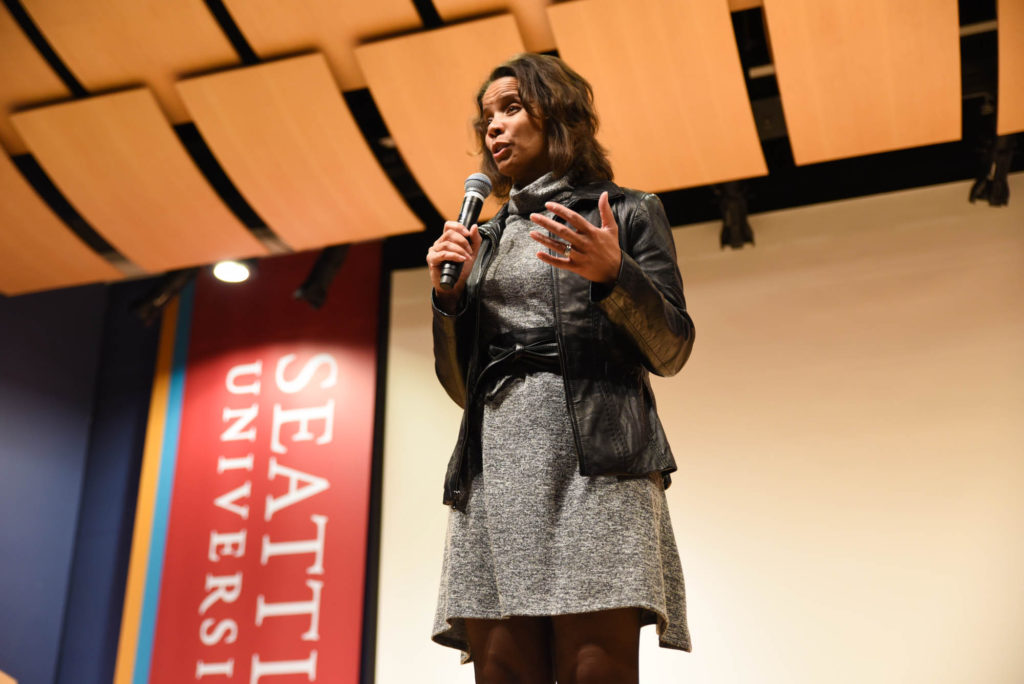Last spring, Seattle University students and community members challenged the “curriculum, culture and climate” in the Matteo Ricci College. The group of students, known as the MRC Coalition, held a sit-in within the MRC office for 24 days and demanded a reform of what they called a eurocentric curriculum, as well as the resignation of then Dean Jodi Kelly, who subsequently retired in July.

Dr. Leah Francis giving her talk, “Ferguson at the Intersection of Faith and Justice”.
In the nine months following the sit-in, the college is moving toward creating a more representative curriculum and cultivating an environment that is both inclusive and empowering. In response, the college has been hosting a quarterly college-wide event in which a hired speaker discusses social justice issues with MRC students and faculty.
This quarter, the college invited Leah Gunning Francis, author of “Ferguson and Faith”, to discuss the relationship between police brutality and religion.
Junior humanities for leadership major McKenzi Bravo protested in the spring and has continued working for change as a student member of the task force dedicated to these improvements. She explained that this event will inspire further conversation about this crucial intersection.
“I definitely think that it is an interesting discussion that is hopefully thought-provoking and ignites some sort of action or responsibility in my peers that thought that racial justice didn’t necessarily include them or need them,” Bravo said.
Third-year psychology and humanities for leadership major Zeena Rivera, also on the task force, spoke of the progress since last spring.
“A goal for the college this year and in following years is going to be to continue doing events like this,” Rivera said. “We had two really great speakers who talked to our college about unpacking whiteness and seeing whiteness, and so it’s really cool to see these programs being programmed by our college about race identity, racism and racialization.”
River emphasized that they believe the sit-in was necessary for these changes.
“I think this is a direct [result] of the sit-in,” they said. “I think what will make it even better is if this just becomes normal for our university.”
Matteo Ricci College Interim Dean Paulette Kidder explained that these quarterly speakers are a part of the greater plan to make changes to MRC.
“We have intellectual work to do that we’re working on as a group,” she said. “The faculty are having workshops separately from the students on inclusivity, and the curriculum is being revised, and this workshop is something where the whole community can come together and have a common experience around these issues.”
More specifically, Kidder said that the strategic planning task force is working on their recommendation, to be released likely within the next few weeks.
Overall, the changes will entail modifying the curriculum, the syllabi of classes and the assigned readings. Ultimately, Kidder plans “to turn in a major program revision, and revise the MRC core very significantly.”
At the event, Francis discussed a wide variety of topics related to the intersectionality of faith and social justice, something she described as “integral to the very tenets of our faith.”
In discussing this intersection, she critiqued the savior mentality of some clergy, instead emphasizing the mentality of community. She said that many of the clergy she encountered didn’t believe their role to be to “come to save the day,” but instead to “come to where you are, stand with you, in a spirit of openness and humility and hospitality and welcome.”
Further, Francis argued that simply praying doesn’t suffice.
“We pray, but we also, as Frederick Douglass said, we pray with our feet,” she said. “Faith without works is still dead, and so the whole idea of the either/or doesn’t quite jive with the tenets of our faith, nor with the realitiesofourlives.Andsotobeable to embody both/and, and to bring the both/and of the spiritual and the practical together, is where we can really see the transformation that we’re so longing for.”
In terms of what the church itself is failing to do, Francis argued that it needs to recognize its own mistakes.
“It behooves the church…to talk about having some real humility,” she said. “To say, ‘We have been wrong, we have messed up, we do need to really have our own come-to-Jesus meeting and think about and talk about what we need to be doing differently here,’ instead of demonizing young people for not wanting to be affiliated and associated with them.”
Moving forward, Francis shared her hope, reaffirming her faith in God and in her peers.
“We never know—we’ll never ever be able to know—how the things that we do can have impacts in lasting ways on people that we wouldn’t have imagined,” she concluded.
For now, the college will continue pouring in efforts toward reform.
Josh may be reached at
jmerchant@su-spectator.com







